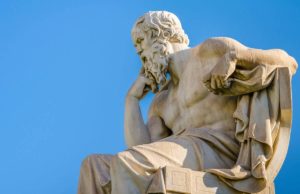
The word wisdom is one we may use casually without really thinking about what it means. If we reflect on how we use it, the word wisdom relates to truth. It has to do with seeing the truth about something. The truth about that something might have many dimensions. In addition, we are not wise until we can relate the truth about that something to every other truth we know, and ultimately to every other truth about everything. Paradoxically, we can know this even though we can’t do it.
In addition, I think the word wisdom also has a moral dimension. It is good to see the truth and good to put that truth into the service of goodness.
Thus, in the widest sense, a wise person knows the meaning of life (truth) and how to live (goodness).
If one of your children got into some kind of trouble, and you were wise, you could figure out if the behavior really was bad or was just something people said was bad but really wasn’t. You could know how bad it was if it really was bad, whether your child really it did it, and what could or could not be done about it.
In Solomon’s famous example, the wise king was able to figure out which of the two women was really the mother of the baby both were claiming (truth), and which was the one who should be given the whole baby to care for and love (goodness).
Now, if we turn from natural wisdom to wisdom that includes Divine Revelation, Fr. John Hardon, in discussing the Old Testament Book of Wisdom, defines wisdom as “knowledge that is so perfect it directs the will to obey God’s commands.” Do, the wise does the very best thing, which is to do what God wants. But to do it, he or she must first know what that best thing is.
Now, let’s move on to the Gift of the Holy Spirit of wisdom. According to Fr. Joseph Thomas, “Wisdom allows the Christian to perceive God as the cause and end of all things.”
Hardon says this in greater detail. Wisdom is
The first and highest gift of the Holy Spirit. It makes the soul responsive to God in the contemplation of divine things. Where faith is a simple knowledge of the articles of Christian belief, wisdom goes on to a certain divine penetration of the truths themselves. Built into wisdom is the element of love, which inspires contemplative reflection on these divine mysteries, rejoices dwelling on them, and directs the mind to judge all things according to their principles.
The gift of the Holy Spirit of wisdom, then, is a gift of seeing the truth and goodness of God, whereas natural human wisdom, as valuable as it is, is more focused on the truths and goodness of created things.
The gift of wisdom is focused on God himself. We contemplate, that is, think about in prayer, truths about God. The Holy Spirit helps us to know God from God’s point of view. But to know God is also to love God. To know God and to love God means we can then judge all created things and the truth about them from the perspective of the one who made them all.
Personally, I’m just beginning to understand what the gift of the Holy Spirit of wisdom means.
For a Doctrinal Homily Outline for the Twenty-Second Sunday in Ordinary Time, please click here. The focus is on the Cross.

Leave a Reply